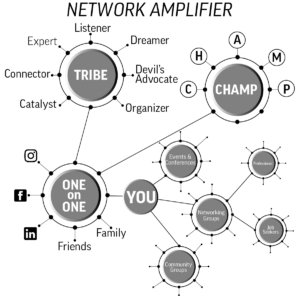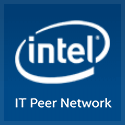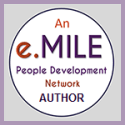Rivers of Thought
Life, Leadership, Business & Technology

The Network Effect is commonly applied to business and economics to describe the effect on the value of a product or service by adding more users of the product or service. There are great examples of the network effect all around us. Think of the value of Facebook or LinkedIn if only a handful of people belonged. Think of the value of your phone if there was no one else to call.
The network effect can also be applied to, well, you! The broader and more diverse your network is, the more valuable it becomes…to you…and everyone you are connected with. Nowhere is this more apparent than when you are involved in a job search. Speaking from personal experience, I did not fully understand the value of a network until…I needed one!
What’s the connection between networking and being in transition? Over 85% of all jobs filled today can be attributed to the candidate having a network connection into the organization. That connection may have let them know of the opening (hidden job market). They may have provided a warm introduction to someone in the company, perhaps even the hiring manager. They may have sent a recommendation to the hiring manager, HR department, or an influencer within the organization.
Networking: Getting Started
Networking of this type may not come naturally to you. I know it did not to me! One of the best secrets I learned is it’s not about you. Even if you are in transition. Even if you are seeking your next gig. It’s about the other person. You are not reaching out to ask them for a job. Take that pressure off yourself! Reach out seeking to learn. You want to learn about their job, their company, their industry. Ask them questions like, “Tell me about your role with XYZ company, What led you to that position?” Get them talking.
Of course, you will need to share a bit about you and your career journey, but don’t make it a monologue. Tell your story…briefly. When you are in transition, you will want to include two “asks” in every networking conversation you have. Always ask what you can do for them. You may not think you are in a position to help, but you are. Even if they answer with nothing, think of a connection, think of a relevant book, recommend a relevant podcast. The second ask should be “Is there anyone else in your network I should be talking to?” Your goal is to come away with introductions to two or three people.
Network while in transition
In my book Amplify Your Job Search: Strategies for Finding Your Dream Job, I provide guidance for building or expanding your professional network. There are several ways to quickly build connections. Look for industry groups in your area, for example. They may not be conducting face-to-face meetings in this environment, but they certainly have virtual meetings you can attend and meet other professionals. Many cities have groups specifically for job seekers. Locate those groups and start attending meetings. You will meet others. This will not only expand your network, but they will provide reassurance that you are not in this alone.
Think about groups you already belong to such as church groups, civic organizations, hobby clubs. All of these groups provide opportunities to meet others and grow your professional network. They also provide common interests for those awkward initial conversations.
Of course, social media provides key platforms to connect with other professionals. LinkedIn can be a goldmine for networking. Reach out and make new connections. Invite them to coffee (virtual or otherwise). You will be surprised at the number of people who will want to help.
Tribes and networking
Networking can sometimes feel a bit random. To help guide you in developing a strong network I recommend two resources. The first is Igniting the Fire Starter by Jason Barnaby. In his book, Barnaby describes the essential roles we all need in our immediate network, or “tribe” as he calls it. These roles include The Listener (someone who is a good listener), The Dreamer (someone who asks “what if”), The Devil’s Advocate (someone who points out potential traps), The Organizer (someone who helps think through the “this before that”), The Catalyst (someone who gives a kick in the pants when we need one), The Connector (someone who loves to make introductions), and The Expert (someone who has “been there done that”). Check out Jason’s website at www.firestartertribe.com to learn more and to download the free Tribal Inventory.
Diversify Your Net
Think about your network. Does everyone look like you? Do they sound like you? Is everyone thinking like you? If so, you need to diversify your network. In her book, Network Beyond Bias, author Amy Waninger, provides two great tools for identifying the gaps in your network. The first is CHAMP. Who in your network fits the CHAMP roles? C is for your customer, H is someone you would hire or recommend to be hired, A is for associate, someone in your peer group, M is for a mentor, and P is for protege (who do YOU mentor?).
The second tool is the IGGNORE matrix. Who in your network is in a different Industry? Who is in a different Generation? Is there someone of a different Gender? How about Nationality? Are there people in your network with a different sexual Orientation than yours? Are different Races represented? With whom in your network have you Exchanged personal stories, not just pleasantries?
If you have gaps in your tribe, CHAMP or IGGNORE networks be intentional about filling those gaps. It will broaden your perspectives and insights. It will also open up other opportunities in your search that you may not have even known existed.
Find Amy’s work at www.LeadAtAnyLevel.com to learn more about her valuable work!
Why Network
Finding your next opportunity is only a small part of why you need a vibrant professional network. Having a vibrant and diverse network dramatically expands your knowledge. As you exchange insights across your network you will be exposed to a vast pool of thought, perspectives, and opinions. The more you give to this network, the more the network will return to you! THAT is the network effect!
I’ve written more on the power of a professional network check out some here: Network (admittedly some of these are about that other kind of networking)
 What a journey. Yesterday, August 24, 2020, saw the publication of my second book Amplify Your Job Search: Strategies for Finding Your Dream Job. While it took a bit longer than my “summer vacation” it was my focus for about 5 ½ months. If you will indulge me, I’d like to take you back and tell you the story of its creation.
What a journey. Yesterday, August 24, 2020, saw the publication of my second book Amplify Your Job Search: Strategies for Finding Your Dream Job. While it took a bit longer than my “summer vacation” it was my focus for about 5 ½ months. If you will indulge me, I’d like to take you back and tell you the story of its creation.
Amplify Your Job Search was not the book I set out to write in 2020, in fact, in 2019 I started writing Amplify Your Leadership, a book about leadership from “everyday leaders”. The book was to be comprised of stories of leadership from people most have never heard of. Stories like that of Al Hiser, the retired building and grounds superintendent of First Baptist Church in Indianapolis, and his work to build leaders out of a group of kids who worked for him taking care of the church. Or, Melvin Velazquez Feliciano, whose leadership in the face of natural disasters in Puerto Rico has been a lifeline to many who have lost everything. Or, the plant manager of a steel mill in Indiana, whose servant leadership inspired hundreds of his co-workers over his career. Or the woman who is a leading voice in the movement of eliminating racism in our technology. Or the women who are at the forefront of artificial intelligence in healthcare.
In January, after my father’s death in December, I started to write a book about my journey alongside my father as he battled dementia over the last seven years of his life. It was to be the story of role reversal as the parent became the child and the child became the parent. The battles of taking away the car keys. The tear-filled conversations of moving him, first from the home he had shared with mom until her death, and ultimately to the health center. The good times we had cheering on the local baseball team from our seats on the third baseline. The family memories of the holidays and birthdays.
I soon realized…it was too soon…too raw.
In March, the pandemic began to spread across the U.S. Companies began to talk of reductions in force, layoffs, and furloughs, my own company included. I saw friends being impacted. I read stories from across the nation. I knew what book I had to write!
I put those books on the virtual shelf and began to write Amplify Your Job Search. March 16th I began to work on the outline. From March 16th to August 24th, from 0 words to over 39,000 words, from an idea to book. Let me share a bit of the sausage-making. I have chosen to use the independent publishing route for both my books. This means, unlike traditional publishing where you would write the manuscript and submit it to publishing houses or agents in the hopes it catches their attention, or self-publishing where you pay a fee to a publishing house to take your manuscript and guide you through the process, in independent publishing the author assembles a team: copywriter, graphics artist, editor, proofreader, interior design, and formatter.
In the case of Amplify Your Job Search I assembled a superstar team. No way does this book get published in five and a half months without this incredible team. My creative process is to write an outline for the book. I then start to write and I write from introduction to conclusion. As each chapter is completed I send it to my wife, Carmen, and my son, Brad. They are my “guard rails”. They tell me if what I am writing makes sense, they tell me if I am off base, they tell me if my jokes are funny (or not), they tell me if I get on a rant and need to be talked down a bit. Once I have the first draft done, I go back and incorporate their suggestions as well as some of my own. That completes draft two.
As I began to work on draft three, I engaged with a graphics artist extraordinaire, Jennifer Vogel. Jennifer and I worked together at InterVision. We started working together on my side hustle of being a speaker a year or so ago. She has an amazing talent at making my words come alive in the slides she designs. Who better to help on this project! Jennifer designed all the graphics inside the book as well as the cover.
I also reached out to Lori Paximadis of Pax Studios. Lori’s editing service was recommended to me by author Julie Kratz. Much to my delight, I learned Pax Studios could also handle the proofreading, interior design, and formatting of the book. When I told her my target date for publishing on August 24th, she barely batted an eye, instead of saying, “well, that’s aggressive, it’s doable but aggressive. Here’s the timeline we need to hit to make that date.” And be “we” she meant ME as well!
Next on the team were the copywriters. It may seem strange that a writer needs to hire a writer, but a copywriter has very specialized skills. They are the ones who write the ad copy or the sales copy we all read. I don’t begin to know how they work their magic, it is a skill I do not possess. I reached out to another co-worker, Daniel Lassell. Daniel is an extraordinary writer. He and I collaborated on most of the writing I produce for InterVision. He very quickly learned my voice. He learned it so well, there are times I have a hard time knowing where my writing ends and his begins. He introduced me to his sister-in-law, Ruth Finley. Together they wrote the back copy, the interior author bio, and the copy for the two “ads” at the back of the book (one for my first book, and one for my mailing list).
Draft three complete. My baby was now in Lori’s hands to edit. This round of editing is called content editing. Yes, she identifies misspellings and grammar issues, but she is reading the content. As she reads the manuscript she challenges my points, corrects the “storyline”, and makes sure the entire book conveys the message it is supposed to convey. Lori does tremendous work and she made the manuscript stronger.
After two rounds of copy edits, time to send the book to the proofreader. Lori designed the interior layout and moved the manuscript into that layout to send it to the proofreader. Because the editor and proofreader should be different people, she arranged to work with a proofreader she trusted for the final edits.
While the book was in the hands of the proofreader it was time to rest! NOT! For Amplify Your Value’s audiobook edition, I worked with a professional narrator, Ron Fox. I wanted to give it a try myself. I reached out to a local recording studio. The same owner/engineer that recorded all of Brad Real’s hip-hop hits ten years ago, back when I was a hip-hop record company mogul, you know, the P-Diddy of Indianapolis! I booked some time at 416 Wabash Recording Studio and Carmen and I headed downtown to channel my inner rockstar. I LOVED it! I promptly booked six more sessions with the engineer, Mitch Lohman. The audiobook will be coming out any time now!
At the end of July, I received the finished manuscript from Pax Studios, the graphics were complete, the sales copy was written and I had begun to promote the book on social media. I enlisted the help of another friend, Alicia Gaba, to help me write the press release (yet another writing style that requires skills I don’t have!) And, I launched my ART.
An ART is an advance review team. This is a group of volunteers that get a PDF copy of a book before it is published. They help promote the book in their networks. When they have finished reading the book (hopefully before the publication date) they write a review. On the day the book launches, they buy a copy at a very discounted price and then post their review. This identifies them with Amazon as a verified purchaser which helps raise the book in the Amazon algorithm. I called my ART, Amplifiers! During the weeks leading up to the launch I read some contests and awarded the winning Amplifier with an Amazon gift card…and no, they didn’t have to buy my books with their winnings!
Also during this time, I worked with Jennifer and Lori to create a journal as a companion to the book. Amplify Your Job Search Transition Journal is a lined journal designed to track your journey through your transition. Oh…and I am also working on a workbook they will guide the reader through the exercises in the main text.
As they say, “it takes a village”. Nowhere is this more apparent than in the world of independent publishing! Thank you to all the professionals, friends, and colleagues that have helped support me in this process!!
 “How do you stay motivated during a job search?” Thas was the question posted on LinkedIn recently. My guess is it was posted by someone who was frustrated with their current search and was feeling very de-motivated. A job search can be very frustrating in “normal” times. In these COVID-19 global pandemic times, it can be downright depressing. We’ve been conditioned to send out dozens and dozens of resumes with the hope of getting a response. Many times we hear nothing. Occasionally, we may get a response that is a polite, “thanks, but no thanks” to our skillfully architected resume, receiving no actionable feedback.
“How do you stay motivated during a job search?” Thas was the question posted on LinkedIn recently. My guess is it was posted by someone who was frustrated with their current search and was feeling very de-motivated. A job search can be very frustrating in “normal” times. In these COVID-19 global pandemic times, it can be downright depressing. We’ve been conditioned to send out dozens and dozens of resumes with the hope of getting a response. Many times we hear nothing. Occasionally, we may get a response that is a polite, “thanks, but no thanks” to our skillfully architected resume, receiving no actionable feedback.
As our search stretches from days to weeks, to months the pressure and the stress mounts. So, how do you stay motivated during a job search?
Go to work!
Approach your job search like, well, a job. Your job is to locate your next job. Create a routine. Get up at the same time you were getting up when you were employed. Get showered, dressed, eat breakfast, and go to work. If possible set aside space in your home where you can work, uninterrupted (I know this is challenging with work-from-home spouses and virtual learning school children).
Set measurable activities
Manage your daily activities. Your time should be focused on the activities most likely to create success. Statistics show that 87% of jobs filled are filled through professional networking. That means networking is your most valuable activity. Spend 80-90% of your time or about seven hours a day on building your network.
Review your accomplishments
Celebrate the victories. When your spouse asks, “how many jobs did you apply for today?” Tell them about the valuable connections you made, the deep conversations you had, and what you learned from those conversations. Every networking meeting is a step closer to your next job.
While thinking about your accomplishments, think about all your accomplishments in your career. You’ve done some great work! Acknowledge that to yourself!
Reflect on the journey
You knew journaling was going to find its way into my answer, didn’t you? Start a transition journal. Spend time writing in it each day. Write about your successes, write about the challenges. What are you thinking? What are you feeling? Take time periodically to read back through your journal. Take encouragement from the progress you have made.
Give yourself some slack
When you were employed, did you ever have one of those days? You know, the kind of day that is a grind just to get up and go to the office. The day drags by. Give yourself some slack. Those days are going to happen in your search. Acknowledge it. Try to make the next day better. Give yourself some grace, take a day off. Rest, recharge, and attack your search again tomorrow.
Stay connected
No, I don’t mean connected like the internet-connected, I mean, stay connected to yourself and others. One of the key elements of dealing with stress is connectedness. Stay in tune with yourself and your stress. As stress begins to mount, reach out to a family member, reach out to a friend. Talk to them. Share your frustrations, vent. They will understand. Reach out to me, I’m happy to jump on a Zoom call!
Have a question? Send it to me at [email protected] and I will be glad to share my thoughts.
Many of these ideas are featured in my new book, Amplify Your Job Search – Strategies for Finding Your Dream Job! Learn more and order your copy by clicking on the cover: 

Insights is the weekly, thought-provoking newsletter from Jeffrey S. Ton.
Every Tuesday – Delivered to your inbox.
A different focus each week:
Leadership Thought – A lesson-learned, an insight shared
Leadership Q&A – A response to a reader’s or a connection’s question
Leadership Spotlight – A highlight of a person or company helping others to grow their leadership
Rivers of Thought – A more personal thought, observation or musing



